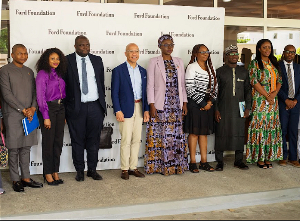 Executives captured in a photo
Executives captured in a photo
Young leaders drawn from across Nigeria have called for greater opportunities to be involved in the country’s democratic processes.
At a convening organized by LEAP Africa with support from the Ford Foundation, discussants agreed that though Nigeria has made significant democratic strides since transitioning to civilian rule in 1999, challenges persist such as– electoral irregularities, political violence, insecurity, corruption, and rising authoritarianism, which are eroding public trust and confidence in the country’s democratic processes and leaving the youth in particular disillusioned.
Setting the context for the discussions under the theme “Sustaining Democracy in Times of Crisis: Young People’s Role in Sustaining Democracy in Nigeria”, youth leader and activist Fauzudeen Mahmoud, a member of the Imaginative Futures Group noted that though the youth are the largest demographic in Nigeria, constituting 70% of the populace, they face limited political participation opportunities, economic marginalization, and social exclusion which hinders their ability to fully participate in the democratic process and realize their potential.
He said the solution to creating Nigeria we want is “by electing people who are competent and they, in turn, will create institutions that are inclusive, responsive, and resilient”.
To further address these challenges, Hamzat Lawal, Executive Director, CODE, noted the importance of data and information in creating the needed change in any society. He advised the youth to leverage accurate data and information to sharpen their technological skills and inform their decision and activism to enable them to make an impact on the country’s democratic processes.
Simi Olusola, Executive Director, Aspilos Foundation, urged her fellow youth to be bold and seize every opportunity to be a part of the political and democratic processes. “As youth, we must change the misconception that we are young and inexperienced. We must put in the work and effort required when given a seat at the table.”
This, she said, will put them in the forefront of critical democratic decisions instead of consistently settling for political decisions that have been made on their behalf.
Iyin Aboyeji, CEO of Future Africa, on his part, stated that impactful changes can only be made to the country’s democratic process when the youth are adequately empowered economically and have the requisite resources to fund their democratic interests.
“Usually, the focus of democratic discussions is the political effect on socio-economic activities. Today, I would like to spend some time speaking on the effect of socio-economic activities on political processes. As a facilitator of growing young businesses, we had some young minds spending some time with us, and by 2020 - a span of six years, they were running their own businesses and earning in US dollars with some having their money in Bitcoin as well”
“Faced with the brutality by the Special Anti-robbery Squad (SARS), these young minds decided to crowdfund the #ENDSARS movement to bring an end to police brutality in Nigeria. A democratic activity they embarked on their own, with their resources. Without the needed economic reach, we cannot attain the Nigeria we want. We must realize that relying on the government can only get us so far,” he said.
Darren Walker, President of the Ford Foundation, said the issue of youth development and Youth leadership is central to the future of Nigeria and to achieving the overall goal of sustainable democracy.
The guest of honour at the event, Dr. Jamilla Ibrahim, Minister of Youth Development, emphasized the government’s commitment to creating more opportunities and including youth voices in democratic processes in the country while promoting good governance throughout the country.